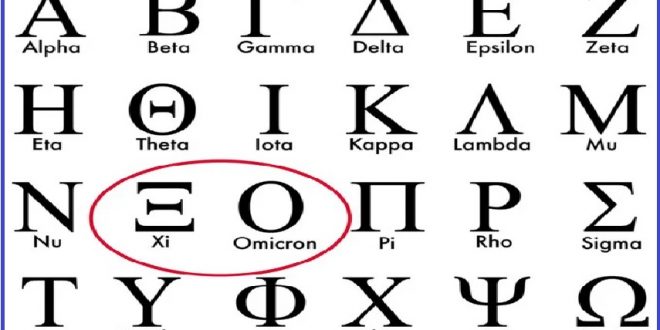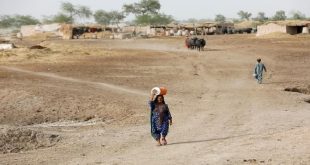28-11-2021
GENEVA/ JOHANNESBURG: The World Health Organisation (WHO) on Friday categorized a newly found coronavirus variant in South Africa as a “variant of concern.”
 On November 9, WHO released a report stating that the initial infection was detected in a sample and named it Omicron, a letter in Greek alphabet.
On November 9, WHO released a report stating that the initial infection was detected in a sample and named it Omicron, a letter in Greek alphabet.
Scientists believe the new variant, also known as B.1.1.529, is linked to the recent “exponential rise” in COVID-19 infections in Gauteng, South Africa’s most populous province. However, experts are currently trying to determine whether the novel variety is truly to blame.
Whereas, WHO reports that the number of cases of this variety appears to be increasing in practically all of South Africa’s provinces.
Although the origin of the new variant is still unknown, it was first identified by scientists in South Africa and has since been detected in travelers to Hong Kong, Belgium, Israel and Botswana.
From slightly more than 200 new confirmed cases per day in recent weeks, South Africa’s daily case count soared to 2,465 on Thursday.
Scientists examined virus specimens from the outbreak in an attempt to explain the rapid increase in cases and discovered the new type of virus.
 After assembling an expert panel to review the data, the United Nations’ health agency concluded that “preliminary evidence indicated an increased risk of reinfection with this variant” when compared to other variants.
After assembling an expert panel to review the data, the United Nations’ health agency concluded that “preliminary evidence indicated an increased risk of reinfection with this variant” when compared to other variants.
Why scientists are racing to decode Omicron?
According to latest reports, the new variant appears to contain a large number of mutations about 30 in the coronavirus’ spike protein, which might affect its ability to transmit to humans easily.
There are indications that omicron may be more transmissible in South Africa, according to Sharon Peacock, a professor of public health and microbiology at the University of Cambridge who also serves as the director of the Covid-19 Genomics United Kingdom group.
“When the Ministry of Health in South Africa noticed that the numbers were tripling daily, they inquired, ‘where are these cases coming from?’
Lawrence Young, a virologist at the University of Warwick, described omicron as virus with alarming mutations. He believes that Omicron is “the most severely mutated variant of the virus we (scientists) have encountered” containing potentially alarming mutations not before seen in the same virus.
 Dr. Anthony Fauci, the top infectious diseases physician in the United States, said American officials had scheduled a call with their South African colleagues later Friday to obtain additional information and that there was no evidence the variant had arrived in the United States.
Dr. Anthony Fauci, the top infectious diseases physician in the United States, said American officials had scheduled a call with their South African colleagues later Friday to obtain additional information and that there was no evidence the variant had arrived in the United States.
What we know about the variant?
At this point, scientists believe that omicron is genetically distinct from previous variants such as beta and delta, but they are unsure whether these genetic differences make it more transmissible or harmful.
There is currently no evidence that the new variant results in a more severe form of disease.
Scientists are of the view that it will likely take weeks to determine whether omicron is more contagious and deadly and whether coronavirus immunizations against it are still effective.
However, Peter Openshaw, who is a professor at Imperial College London’s department of experimental medicine said it was “very improbable” that current vaccines would fail [against the new variant], adding that they are effective against several other variants.
 While some of the genetic changes in omicron are concerning, it is uncertain if they will constitute a threat to public health.
While some of the genetic changes in omicron are concerning, it is uncertain if they will constitute a threat to public health.
It is pertinent to note that several other variants, such as the beta version, worried scientists initially but did not spread widely.
“We don’t know whether this novel variation will establish a foothold in delta-affected locations,” remarked Peacock of the University of Cambridge.
“The jury is out on how well this variant will perform in the presence of other variants.”
Delta is currently the most prevalent COVID-19 variant, accounting for almost 99% of sequences submitted to the world’s largest public database, according to Peacock.
The rise of Omicron
As the coronavirus mutates, it spreads, and many new variants, including ones with concerning genetic modifications, frequently die off.
Scientists monitor COVID-19 sequences for alterations that could increase the disease’s transmissibility or severity, but they cannot tell by looking at the virus.
 Peacock speculated that the variant “may have evolved in someone who was infected but was unable to clear the virus, allowing the virus to genetically evolve” in a scenario similar to how experts believe the alpha variant which was first identified in England emerged through mutation in an immune-compromised individual.
Peacock speculated that the variant “may have evolved in someone who was infected but was unable to clear the virus, allowing the virus to genetically evolve” in a scenario similar to how experts believe the alpha variant which was first identified in England emerged through mutation in an immune-compromised individual.
Are travel restrictions by some countries justified?
Many countries are imposing travel restrictions after WHO declared it a “variant of concern”. However, WHO has cautioned countries against implementing rapid travel restrictions, advising them to use a “risk-based and scientific approach.”
According to reports, in addition to the United Kingdom, the United States, and the European Union, a number of other countries have established restrictions.
These include Japan, India, Iran, Brazil and Australia.
Health Minister of South Africa, Joe Phaahla, told reporters that the flight bans were “unjustified.”
“Some countries’ reaction, in terms of establishing travel bans and other such measures, is entirely contrary to the World Health Organization’s regulations and standards,” he said. (Int’l News Desk)
 Pressmediaofindia
Pressmediaofindia




